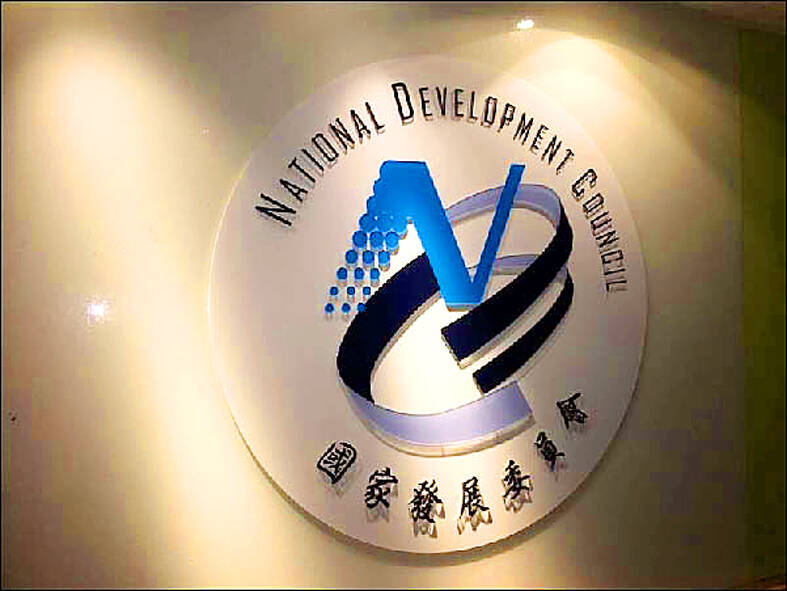The National Development Council yesterday proposed a slate of policies that it said would bolster private sector investments in Taiwan.
A raft of initiatives focused on three areas — stimulating industrial investment opportunities, ensuring an abundant supply of industrial talent, and promoting investment in national infrastructure and several key industries — were included in the report the council presented to the legislature’s Economics Committee.
The report comes after a forecast from the Directorate-General of Budget, Accounting and Statistics (DGBAS) saying that Taiwan’s private investment growth could reach 1.52 percent this year, as domestic semiconductor businesses expand their research and development, and production processes.

Photo: Wu Hsin-tien, Taipei Times
The DGBAS’ forecast was also based on businesses continuing to invest in renewable energy and carbon-reducing equipment as they move toward net zero goals, the council said.
The policy on stimulating investment opportunities would include promoting the development of major industries, and small and medium-sized enterprises, as well as creating an ecosystem for innovation and entrepreneurship, the council said.
Consultation services and guidance for new start-ups would also be provided, while a NT$10 billion (US$307.17 million) fund is to be allocated by the Ministry of Digital Affairs to support projects related to the local digital industry, it said.
Meanwhile, ongoing efforts are being made to relax the rules on work permits, residency, taxation and social security to attract and retain international talent working in Taiwan, the council said.
To entice private businesses to invest in national infrastructure and key industries, the measures would include providing financial assistance and issuing real-estate investment trusts to enhance the effective use of national resources, the council said.
In addition, the government would continue to enhance the domestic investment environment while building upon existing strengths in semiconductors and information technology to promote Taiwan’s economy, it said.

Semiconductor business between Taiwan and the US is a “win-win” model for both sides given the high level of complementarity, the government said yesterday responding to tariff threats from US President Donald Trump. Home to the world’s largest contract chipmaker, Taiwan Semiconductor Manufacturing Co (TSMC, 台積電), Taiwan is a key link in the global technology supply chain for companies such as Apple Inc and Nvidia Corp. Trump said on Monday he plans to impose tariffs on imported chips, pharmaceuticals and steel in an effort to get the producers to make them in the US. “Taiwan and the US semiconductor and other technology industries

A start-up in Mexico is trying to help get a handle on one coastal city’s plastic waste problem by converting it into gasoline, diesel and other fuels. With less than 10 percent of the world’s plastics being recycled, Petgas’ idea is that rather than letting discarded plastic become waste, it can become productive again as fuel. Petgas developed a machine in the port city of Boca del Rio that uses pyrolysis, a thermodynamic process that heats plastics in the absence of oxygen, breaking it down to produce gasoline, diesel, kerosene, paraffin and coke. Petgas chief technology officer Carlos Parraguirre Diaz said that in

SMALL AND EFFICIENT: The Chinese AI app’s initial success has spurred worries in the US that its tech giants’ massive AI spending needs re-evaluation, a market strategist said Chinese artificial intelligence (AI) start-up DeepSeek’s (深度求索) eponymous AI assistant rocketed to the top of Apple Inc’s iPhone download charts, stirring doubts in Silicon Valley about the strength of the US’ technological dominance. The app’s underlying AI model is widely seen as competitive with OpenAI and Meta Platforms Inc’s latest. Its claim that it cost much less to train and develop triggered share moves across Asia’s supply chain. Chinese tech firms linked to DeepSeek, such as Iflytek Co (科大訊飛), surged yesterday, while chipmaking tool makers like Advantest Corp slumped on the potential threat to demand for Nvidia Corp’s AI accelerators. US stock

SUBSIDIES: The nominee for commerce secretary indicated the Trump administration wants to put its stamp on the plan, but not unravel it entirely US President Donald Trump’s pick to lead the agency in charge of a US$52 billion semiconductor subsidy program declined to give it unqualified support, raising questions about the disbursement of funds to companies like Intel Corp and Taiwan Semiconductor Manufacturing Co (台積電). “I can’t say that I can honor something I haven’t read,” Howard Lutnick, Trump’s nominee for commerce secretary, said of the binding CHIPS and Science Act awards in a confirmation hearing on Wednesday. “To the extent monies have been disbursed, I would commit to rigorously enforcing documents that have been signed by those companies to make sure we get